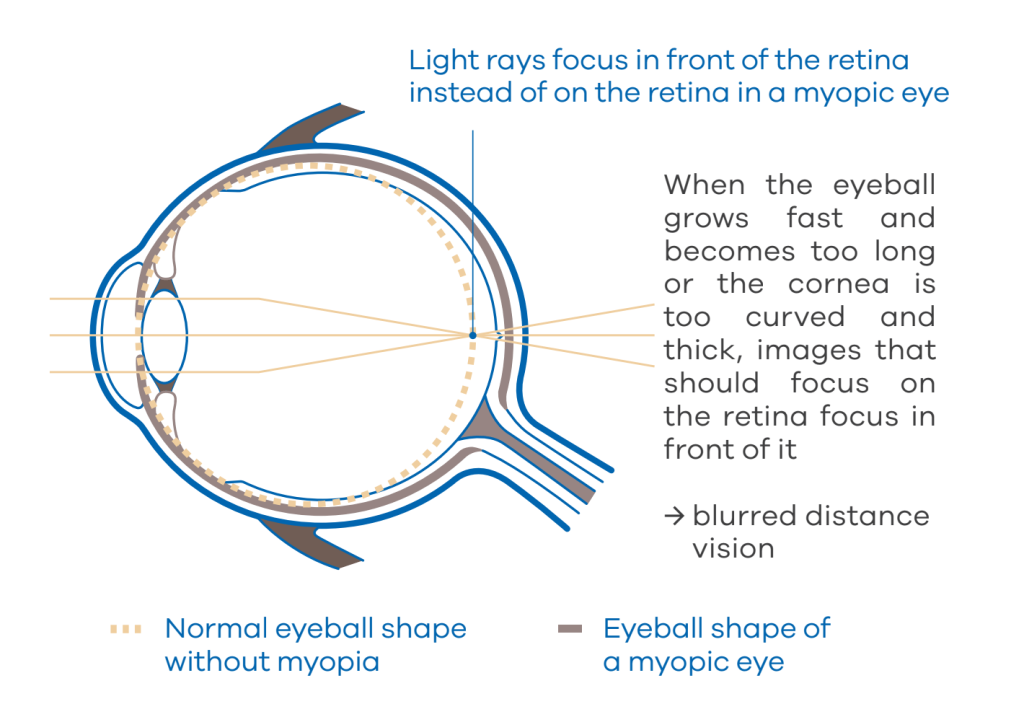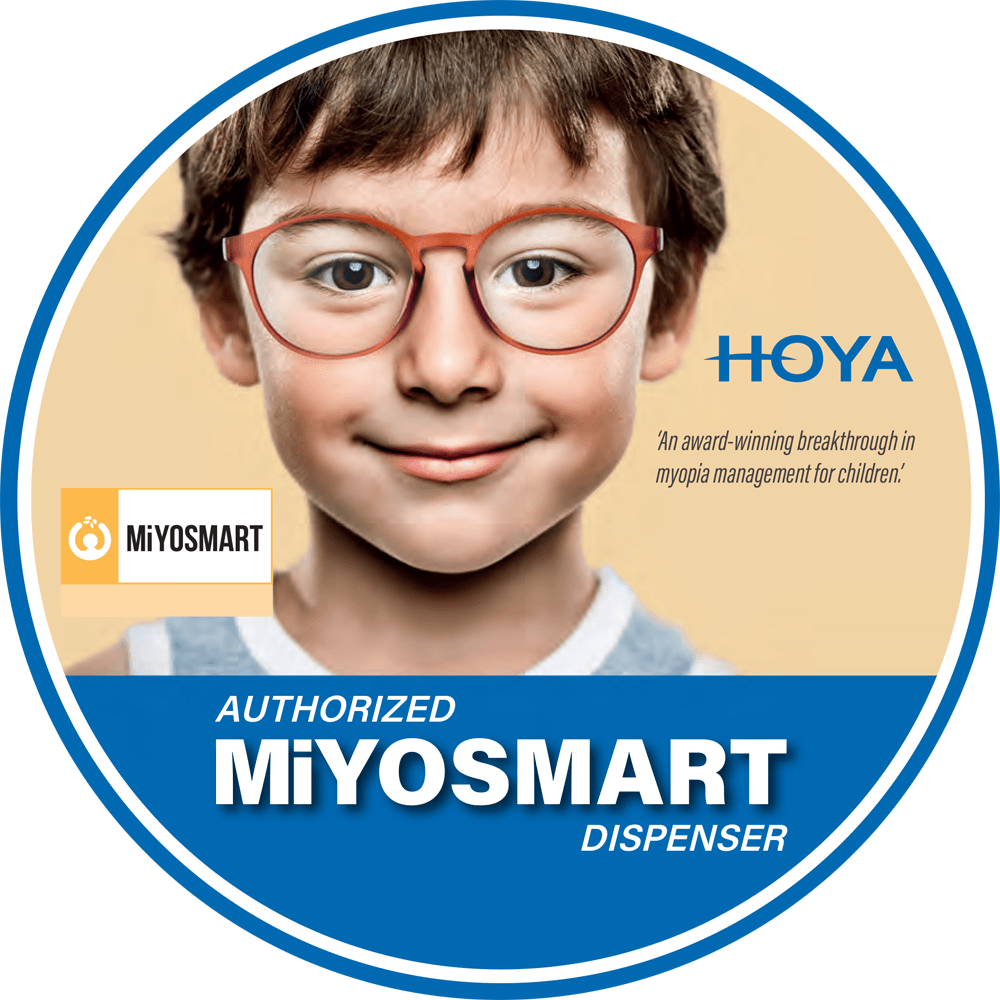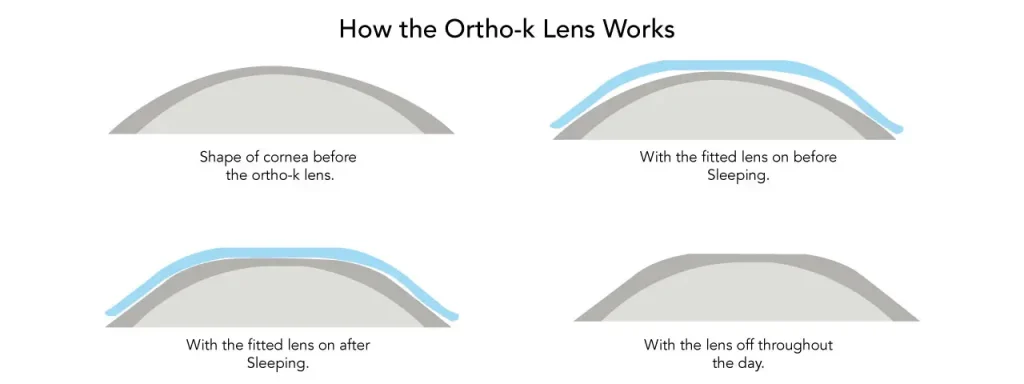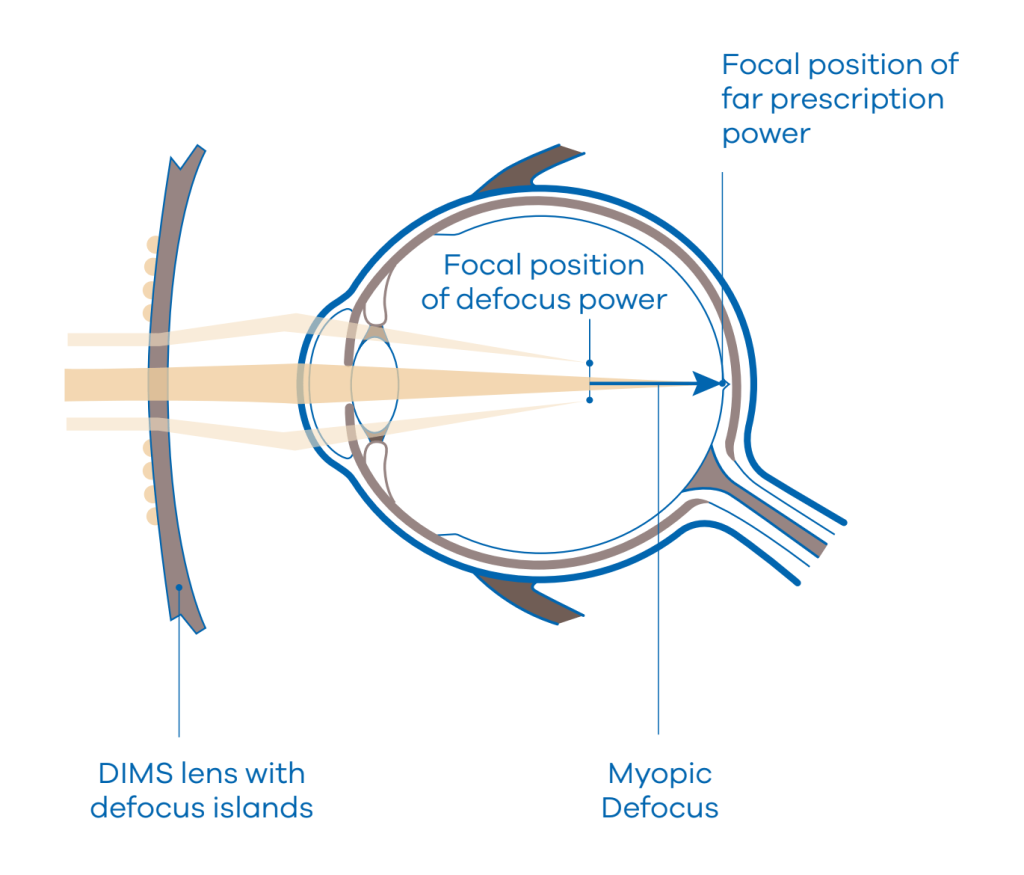Myopia Management
What is myopia?
Nothing is more important than the health and well-being of your child. Now and into the future, you want to see your child thrive. You may have noticed your child struggling to see clearly at a distance, making it harder to concentrate at school and have a fulfilling experience at play. Your child may have myopia, also called near-sightedness. If left untreated in children, it can lead to lasting vision problems. Myopia is a condition where the shape of the eye causes light rays to bend (refract) incorrectly, focusing images in front of the retina instead of on the retina. This occurs when the eyeball (axial length) is too long relative to the focusing power of the cornea and lens of the eye.

The incidence of myopia is expected to increase significantly as lifestyles change, with children taking part in more near-work activities like using digital devices, studying, reading and spending less time outdoors. Hereditary, behavioural and environmental factors also play a part.
Myopia is a growing problem and global concern
Myopia is a growing epidemic and it is estimated that half of the world population will be myopic by 2050. More importantly almost 1 billion people will suffer from vision threatening conditions associated with high myopia such as Myopic maculopathy, retinal detachment, cataract and glaucoma.
Myopia management (control) slows down or prevents the progression of myopia through treatments that reduces the lengthening of the axial length in children and teens. Some adults could also benefit from myopia control if they have progressive myopia.
It has been suggested that conventional single vision glasses are ineffective for myopia control, however different intervention strategies could potentially reduce progression of myopia by up to 60%.
Types of Myopia Management
Orthokeratology (Ortho-K)
Orthokeratology, also known as Ortho-K or CRT is a procedure where rigid gas permeable plastic medical devices, similar to contact lenses, are applied to the eye while asleep. The gentle pressure on the cornea results in reshaping the cornea to correct your vision, eliminating the need for glasses or contacts while awake. This effect lasts all day, people would have great vision without lenses, glasses or surgery and free people from issues with glasses or regular contact lenses for sports, swimming and performing other activities. Orthokeratology has many peer-reviewed, randomized and some longitudinal studies that show it is an effective method to reduce the progression of myopia and, in many cases, halt it altogether.
Soft contact lenses
MiSight 1 day ActivControl Technology helps slow the elongation of the eye and myopia progression while fully correcting refractive error. The lens is designed with two treatment zones to focus the image in front of the retina (myopic defocus) and two correcting zones to correct myopia in all gaze positions. The MiSight 1 day lens is clinically proven to slow the progression of myopia when initially prescribed for children 8-12 years old. MiSight 1day contact lenses were clinically validated in a multi-year comprehensive study.
Myopic Defocus Spectacle lens
Miyosmart lenses are innovative lenses for myopia control that used D.I.M.S (Defocus Incorporated Multiple Segments) technology to reduce the elongation of the axial length of the eye. It’s a non-invasive technology providing a constant clear vision and constant myopic defocus simultaneously. It creates myopic defocus by brining the rays in front of the retina. This prevents eyeball (axial length) elongation which is linked to myopia progression. A two-year clinical trial showed a reduction in myopia progression by 59%.
Why MiYOSMART?
Unique, innovative solution for controlling myopia.
Clinically proven effectiveness in slowing down myopia progression.
Child-friendly, easy to adapt and non-invasive.
How MiYOSMART works
Cutting edge research conducted by The Hong Kong Polytechnic University showed that myopia progression can be controlled by providing clear vision and constant myopic defocus simultaneously.
The DIMS Technology in MiYOSMART was clinically proven to succeed in the control of myopia progression. In 2018, it won the prestigious Grand Prize, Grand Award and Special Gold Medal at the 46th International Exhibitions of Inventions of Geneva, Switzerland. In 2020, it won the Silmo d’Or Award in the Vision category at the Silmo Paris Optical Fair.

York Eye Care Clinic is an authorized MiYOSMART dispenser.
A clinically proven, safe, effective and non-invasive method to manage myopia.
MiYOSMART lenses are an innovative solution for managing myopia in children.
MiYOSMART improves distance vision and at the same time provides effective myopia control. A two-year randomized clinical trial showed on average, a reduction in myopia progression by 60% in children 8-13 years old. This has since been reinforced by 3 and 6-year follow-up studies that showed the slowdown was sustained.
The 6-year follow-up found the average cumulative myopia progression to be less than -1.00D over 6 years, and children who stopped wearing MiYOSMART lenses showed no rebound effect compared to the eye growth in “age-normative” nontreated myopic children. By slowing down the progression of myopia and its associated eyesight deterioration, children can enjoy their lives more by seeing clearly.
Better vision. Better protection.
DIMS Technology
A non-invasive solution that corrects short-sightedness while effectively slowing down myopia progression by 59% at the same time
- Slows axial eye growth by 60%
- Halts myopia progression by 21.5%
Eye Shield
- Impact resistant material that keeps active kids safe
- Provides UV protection
Medication
Atropine, drop or ointment in low dose, has been found by researchers to reduce the progression of myopia. Applied once a day, atropine treatment is continued as long as myopia progression continues. It can be combined with other modalities of myopia managemnet to enhance the effects of myopia control.
Care goes beyond the lens.
Spend time outdoors.
Research showed that spending time outdoors may reduce the risk of myopia and its progression.
Gives eyes a break.
Reduce your child’s eye strain by reminding him or her to take breaks from intensive screen time or near-work.
Seek regular eye care.
Have your child’s eyes checked regularly to ensure that myopia or other vision problems are detected and treated early, reducing the worsening of vision, myopia progression and potential complications of high myopia.
MiYOSMART Frequently Asked Questions
What is MiYOSMART?
MiYOSMART is a spectacle lens design that uses D.I.M.S. technology for myopia control which was developed by HOYA in partnership with The Hong Kong Polytechnic University. In 2018, the MiYOSMART lens with D.I.M.S. technology was awarded the prestigious Grand Prize, Grand Award and Gold Medal at the 46th International Exhibition of Inventions of Geneva, Switzerland. In 2020, it won the Silmo d’Or Award in the Vision category at the Silmo Paris Optical Fair.
How does it work to slow down myopia?
The lens makes use of the natural homeostatic mechanism known as “emmetropisation”, whereby the eyeball adapts and shapes to receive focused images as it does for normal vision. Creating a myopic defocus (bringing rays in front of the retina) as with MiYOSMART lenses, prevents eyeball (axial length)
elongation which is linked to myopia progression.
What are the main benefits of MiYOSMART?
MiYOSMART is a safe and non-invasive option for slowing myopia progression. The wearer receives correction of his/her refractive error while his/her myopic progression is slowed down. MiYOSMART also allows the wearer to move around with ease, as the lenses are impact-resistant. The lens is aesthetically pleasing with its smooth surface and near-identical appearance to single vision lenses. A clinical study concluded that MiYOSMART with D.I.M.S. Technology had myopia progression reduced by an average of 60%.
What is D.I.M.S. Technology?
D.I.M.S. stands for Defocus Incorporated Multiple Segments. It is the basis of HOYA’s myopia control lenses, known as MiYOSMART. The lens is comprised of a central optical zone for correcting refractive error and multiple defocus segments evenly surrounding the central zone (extending to the mid-periphery) of the lens to control myopia progression. This provides clear vision and myopic defocus simultaneously at all viewing distances.

What is the recommended age for MiYOSMART?
In general, MiYOSMART lenses are suitable for patients aged 6-18. It can be prescribed when the first sign of myopia appears and for as long as there are signs of progression. The final determination is made by the Eye Care Professional.
Let’s Get Started
To make an inquiry or to book an appointment, please fill and submit the form below.


